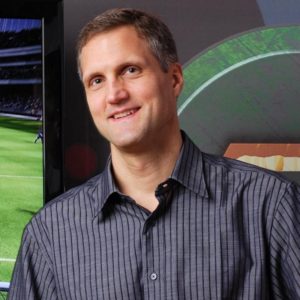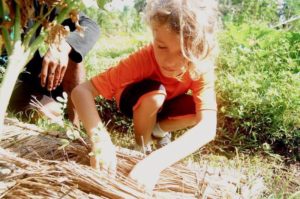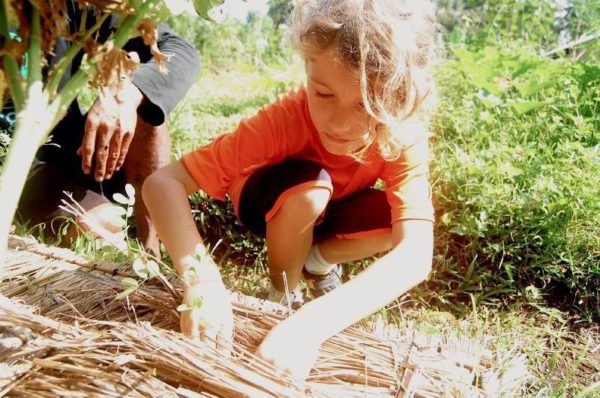I stared in the mirror of the airplane bathroom. Crying.
It happened every time I flew.
On this occasion, I’d just watched the movie Braveheart starring Mel Gibson as William Wallace, the historic Scottish rebel who led an uprising against the cruel English ruler Edward Longshanks. The movie celebrates honor and devotion to a grand cause. Wallace was fighting for the sovereignty of his nation. And he made the ultimate sacrifice.
Me? I was making and selling video games.

I’d started working at EA (formerly known as Electronic Arts) when I was 23, straight out of Stanford. EA was a magical place, filled with dreamers wanting to tell stories through interactive entertainment.
And unlike most of my other friends, who were going into banking, real estate or other more traditional roles, I didn’t have to wear a tie.
I was lucky to have had the opportunity to work with these talented artists. But after 23 years and six countries, I’d literally spent more than half of my life with EA. And the corporate life was stripping me of my humanity and shaping me into something I’d never intended to be. Something was wrenching at me. I was torn between the life I had and the life I wanted. I needed to do something more meaningful..
We enter the world as perfectly-balanced beings. Nature’s measured formula gives us the ability to use our hearts and minds in perfect harmony. And that’s when the internal struggle begins. We start our schooling as curious, alert, alive beings, yearning for learning. Yet education has an insidious side. It slowly, but intentionally strips away the child’s individuality; they are corralled into their designated intellectual quadrant and moved away from their emotional, spiritual and kinesthetic aspects. The focus becomes solely on academic achievement. I, like so many other people, grew up with a simple mantra: go to school, get good grades, go to a “good” university, get a good job, make a lot of money, get married, have two kids, buy a house, put up the white picket fence and then you will be happy.
But we all know that such a formula rarely, if ever, leads to happiness and genuine success. As we embark on the 20-year journey through the morass of academia, we simply lose ourselves. We cease to be the curious creatures designed by nature to learn and take in the mysteries of the world. But the machina academia tells us that we can solve all the ills of the world with our minds. If we get those good grades we’ll be able to fix everything and be successful. We are applauded for our achievements. We are praised for our high marks. But our true selves, our spiritual and emotional beings, are abandoned.
We are set forth into the world ill-equipped to deal with not only our own emotional challenges but also with the challenges of fixing the issues of the world. When we discover that we are so poorly equipped, we feel out-of-balance and disconnected. But we leap off the cliff with the blind faith instilled in us by our upbringing.
Statistics vary but most agree that the majority of people are unhappy with their jobs. The number is as high as 80% in some analyses. The unhappiness lies in the conflict that exists within us, between what we think we should be doing, and what we actually want to be doing. We begin the game of “I’ll just do this for a few more years, make my money, leave, and then do what I want.” Yet it isn’t easy to walk away. And time ticks by. There is the immediate challenge of being brave enough to leave. We don’t know where to go or what to do. We were never taught to follow our hearts, only our heads. We continue the endless pursuit of happiness through career advancement.
Our education system is broken and, I would argue, even immoral and unethical. And I am not alone in this view. I was the former Director, General Manager and Head of Development for Green School Bali, a highly progressive school focused on holistic learning. I’ve spoken with thousands of educators, teachers, and administrators over the years. No one ever defended the current system. In one instance, the head of one of the most prestigious K-12 schools in all of Asia told me directly that the programs they were running were flawed, but had to continue because of state and international requirements, as well as parental pressure. Education has been turned into a processing mill.

But there is hope.
In the middle of the spiritual island of Bali, Indonesia sits a small, funky town called Ubud. I fondly refer to it as the Berkeley of Asia, having grown up just a few miles to the east in the Bay Area suburbs. Bali is home to many coworking spaces including Outpost, The Bridge @ Green School, Dojo, Hubud, and Kumpul. I was the former Director of Hubud. These spaces have been home to thousands of post-cubicle survivors over the past few years. They come because they are searching for something else in their lives and believe that coworking spaces can help them to explore this. Members have launched ideas they have been sitting on for years, explored new career opportunities, refreshed their lives with a change of environment, and — at times — just simply needed a “reset”. Ultimately, they want to find a place where they can be themselves.
Where they can just be.
Coworking spaces provide something new: authentic learning. While classic school is a memory game, these new spaces provide learning and experiences that mix content with context, experiences with theory, vulnerability with confidence. They provide environments which allow people to continue learning as nature provided, and to be excited about their cerebral and spiritual expansion.
Without alternative learning spaces and places like Outpost and the recently launched The Bridge @ Green School we will continue to be stuck in a world where society will keep directing us on how to live our lives. If we continue to live in this fabricated world where we lose ourselves and fail to be able to find the strength to do good, then humanity will continue to face the same challenges with little chance of resolving them.
Sir Ken Robinson, the British author, and adviser on education noted: “The answer is not to standardize education, but to personalize and customize it to the needs of each child and community. There is no alternative. There never was.”
This isn’t to say there aren’t many amazing teachers, as well as amazing schools. But, as a whole, we have a problem. Without the alternatives of something to counter this, we will be in a perpetually horrendous situation, where we will see rape, murder, climate change, war, and genocide continue to ravish our world.
These alternatives are coming from online learning (Udacity, Coursera, Khan Academy), home learning, world schooling, changes of modeling (as in the Finnish school system), forward-thinking educators and coworking spaces. Just ten years ago, people had little choice other than to take the traditional route in school and then get a job. A new world has opened up to us now and we have choice.
I just recently flew from Bali to San Francisco. I was watching a non-fiction movie, Dare to Be Wild about a young lady who won a gold medal at the Chelsea Flower Show in 2002 and challenged the establishment with her beautiful views on nature and our connection to it.
Afterwards I stared in the mirror of the airplane bathroom. Crying.
And I smiled.

